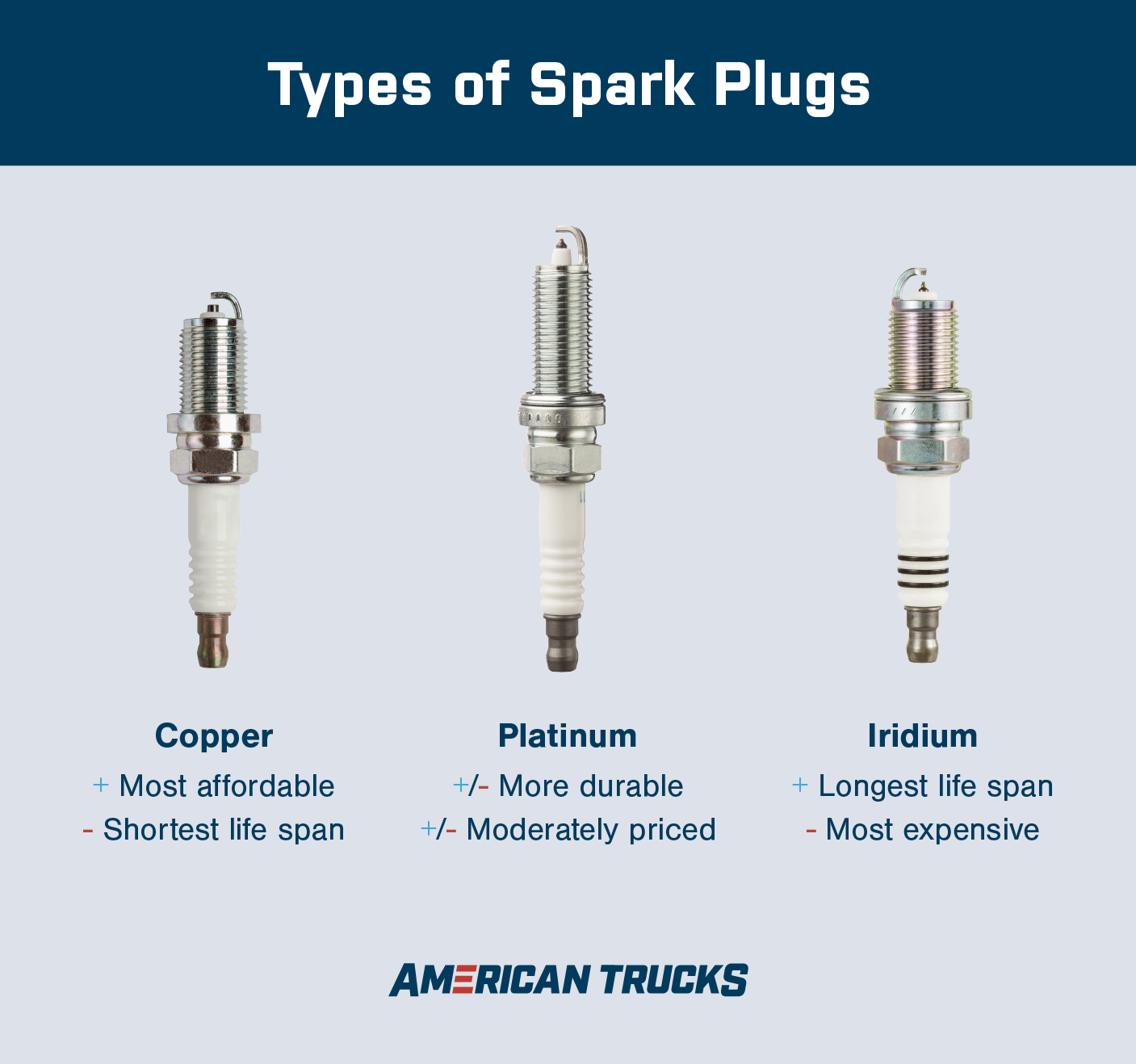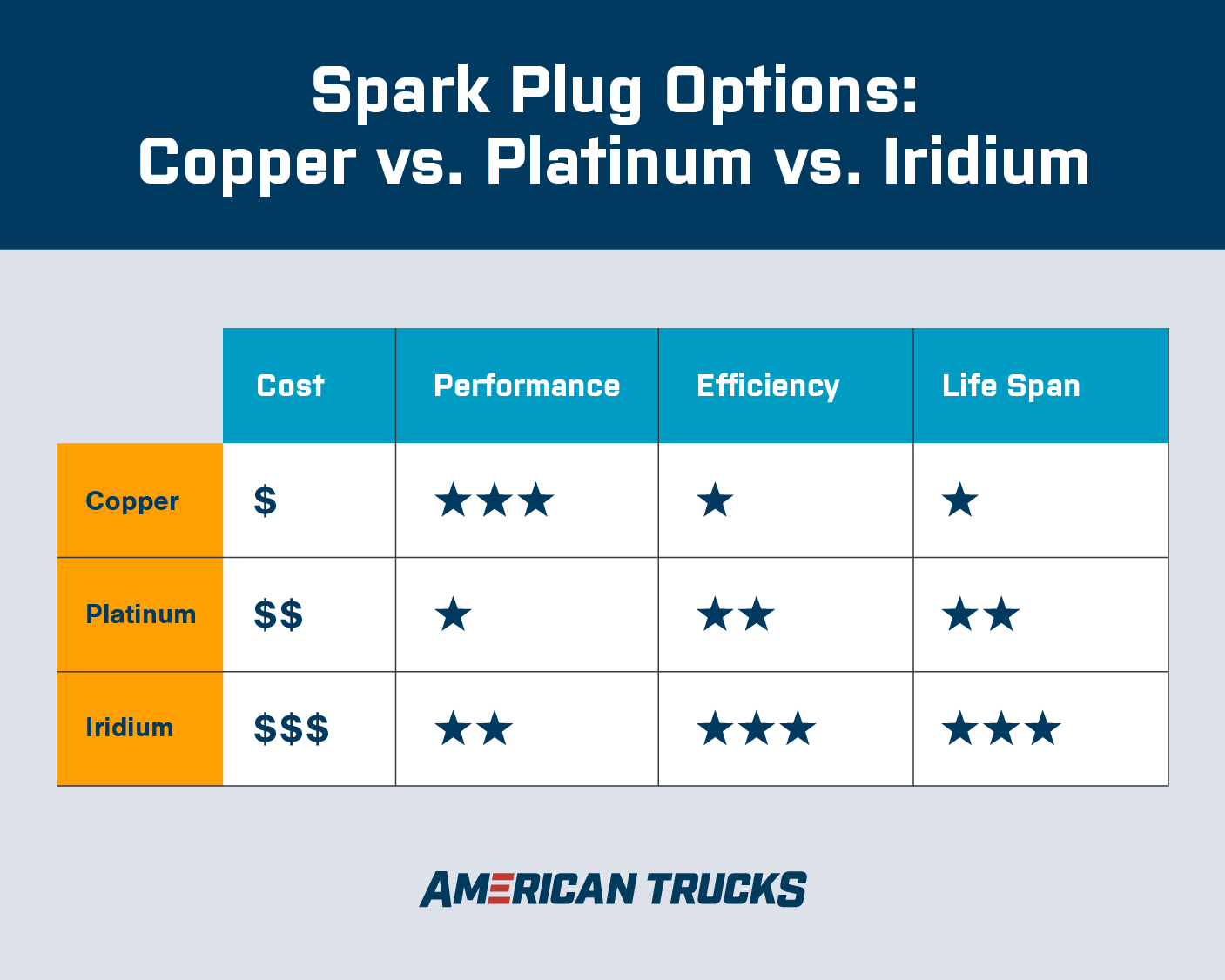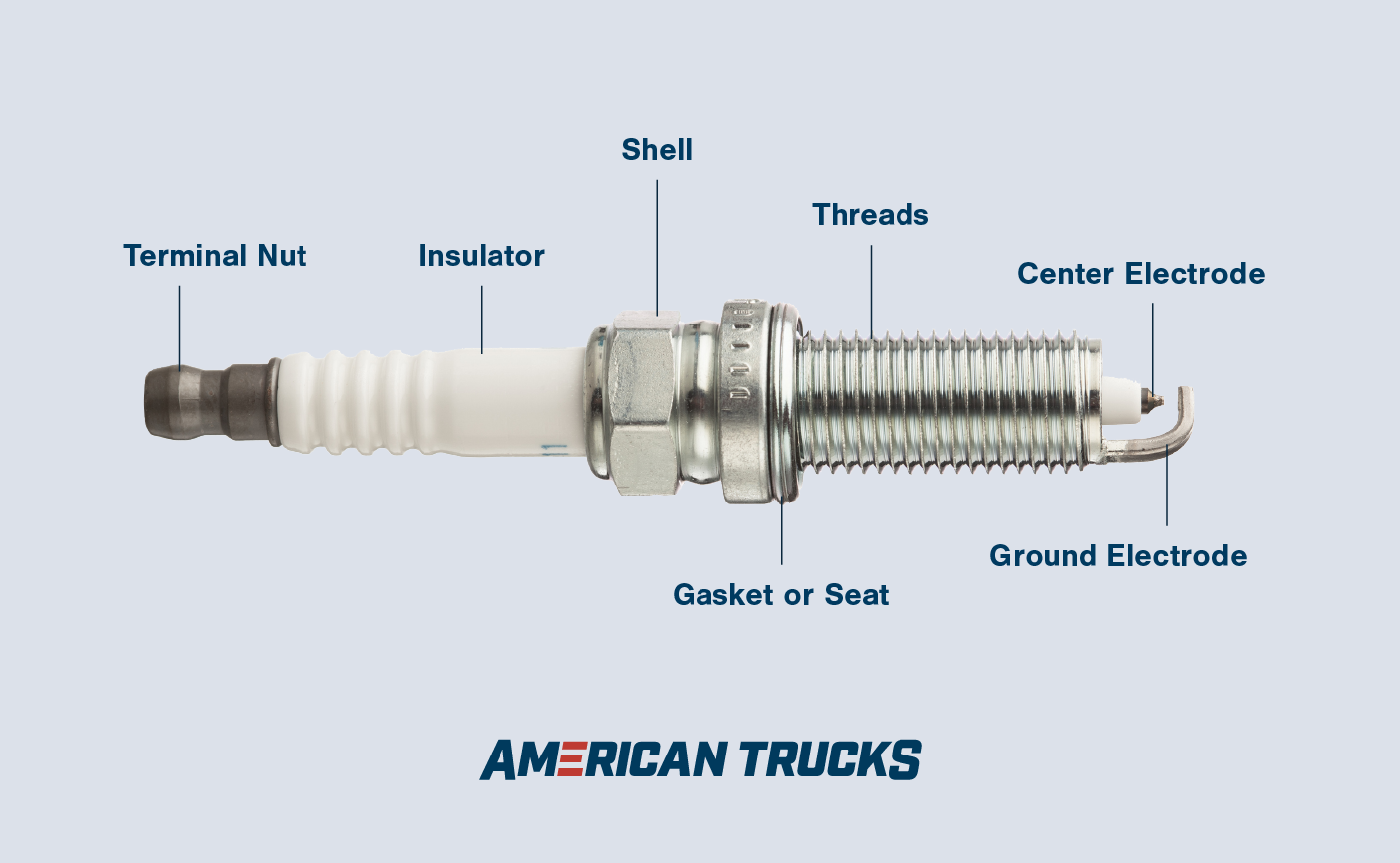The 3 Different Types of Spark Plugs
You can break spark plugs down into three types of metal: copper, platinum, and iridium. Their main differences have to do with cost and longevity, with some more prone than others to fouling (a nicer word for the gunky buildup that accumulates when they've been firing too hot).

Copper
Forget gold—copper is the standard when it comes to spark plugs. This baseline option has a copper core, but the exposed part of the center electrode that actually exchanges electricity with the ground electrode is coated in nickel alloy.
For purposes of comparison with other spark plug types, it might make more sense to call these nickel spark plugs, but that's a whole other conversation.
The center electrodes on copper spark plugs have a wide diameter, which means they require more voltage to produce a spark. And since nickel is pretty soft, these tips wear out quicker than they do on stronger types of spark plugs.
|
Pros
|
Cons
|
|
Widely used
Low cost
Run cool
|
Short life span
Not ideal for performance vehicles
Not for coil-on-plug or distributorless ignition
|
Platinum
As you could probably guess, platinum is a step up from copper. These are essentially the same as copper spark plugs but have a platinum disc attached to the center electrode tip at the contact point between the current and the ground electrode. Since platinum is much harder than nickel and has a far higher melting point, it takes much longer for the tip to wear down.
That higher heat rating also allows them to burn off more of the carbon that builds up and causes fouling. However, since platinum burns hotter and isn't quite as good a conductor as copper, platinum spark plugs suffer a little in performance.
|
Pros
|
Cons
|
|
Moderate cost
Longer life span than copper
Less prone to fouling than copper
|
Moderate performance
Shouldn't be downgraded to copper
Designed for coil-on-plug ignition
|
Double Platinum
Nope, we're not talking about the latest Billboard pickup truck hit.
Double platinum spark plugs have both a platinum disc on the center electrode and another on the ground electrode. Double platinum spark plugs are designed for waste spark systems, in which the spark travels from the center electrode to the ground electrode and back again. The waste comes from that second trip back to the center node, when there's no gas left for the spark to burn.
Iridium
A notch above platinum spark plugs are iridium spark plugs, which are even longer-lasting—and more expensive. Iridium has an extremely high melting point and can be whittled down to a very fine surface and still maintain its longevity, meaning less voltage is required for the same spark.
All these qualities combine for a hyper-efficient, ultra-durable spark plug at a premium price. However, like platinum, iridium isn't as conductive as copper.
|
Pros
|
Cons
|
|
Longest-lasting
Maximum efficiency
Least prone to fouling
|
Most expensive
Less conductivity than copper
Shouldn't be downgraded to either cheaper option
|
Double Iridium
Also like platinum spark plugs, iridium spark plugs come in the double variety. If your vehicle calls for double iridium, it's not recommended to downgrade to double platinum, but you may be able to upgrade from double platinum to double iridium.
Copper vs. Platinum vs. Iridium Spark Plugs
So, how do these three spark plugs stack up against each other? If you've got your choice of two or three of the above, here's how they compare.

What Are Spark Plugs?
Spark plugs are the components in your engine responsible for creating the bolt of electricity that ignites the air/fuel mixture, forcing the engine's pistons to get moving in the cylinders. Most engines have one spark plug per cylinder—unless you've got a Hemi, which has two per cylinder—so if you've got a V6 or straight 6, you'll have six spark plugs.
These little lightning rods have a few important components that could help you understand how the different types of metal affect their performance. From top to bottom, you've got:
- Terminal nut: This is where the spark plug comes in contact with the ignition system, and where the current is first conducted by the center electrode.
- Insulator: Ceramic insulation keeps the current safely and efficiently contained to the center electrode.
- Shell: This hex piece is what a wrench will latch onto when it's time to remove or install the plug.
- Gasket: The gasket creates an airtight seal and keeps the combustion gasses locked in the combustion chamber.
- Threads: Threading allows the spark plug to screw into place inside the combustion chamber.
- Center electrode: The current travels down the length of the spark plug through the center electrode. This extends beyond the threaded shaft and pokes out slightly, where the tip is covered by another metal like nickel alloy, platinum, or iridium.
- Grounding electrode: This electrode reaches deeper into the combustion chamber and is separated by a small space from the tip of the center electrode. The voltage carried through the center electrode creates a spark in the space between these two electrodes.

When To Replace Spark Plugs
It may be time to examine your spark plugs if you notice one or more of these common symptoms:
- Unreliable engine starting or regular misfiring
- Noticeably lower gas mileage
- Jerky driving performance
- Obviously slowed acceleration
- Suspicious lack of power
- Strange engine rhythms while idling
- Check engine light
Spark plugs generally last quite a long time, but the type of plugs you use will have a big impact on longevity. Copper spark plugs, as discussed above, have the shortest life span but can still fire reliably for up to 20,000 miles for most drivers. Iridium spark plugs, on the other hand, can go for over 100,000.
What Type of Spark Plugs Do I Need?
The most reliable way to figure out what kind of spark plug you need is to check your vehicle's owner's manual. For many engines, you can upgrade to a higher-quality metal, but it's never a good idea to downgrade from OEM.
Planning to jump straight from copper to iridium? Some applications might specifically require a copper spark plug or either a single or double platinum or iridium one. As with any aftermarket product, it's best not to assume anything without consulting your manual first.




